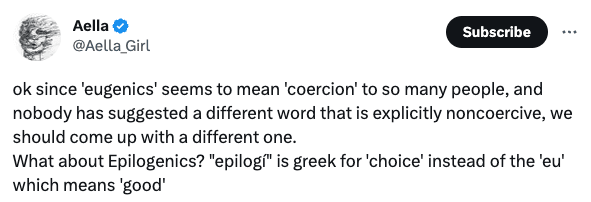I am conditionally in favor of human genetic augmentation. In particular, I think embryo selection for intelligence, health, happiness and other positive traits is desirable. When I bring this up with people, one of the most frequent questions is "Isn't that eugenics?"
I never know how to respond. The term "eugenics" has absorbed so much baggage over the last century that it somehow refers both to swiping right on Tinder when you see an attractive person and to the holocaust.
These are not similar concepts. The fact that we use a single word to refer to both is crazy. I cannot count the number of debates I've heard about human genetic engineering where the disagreement boils down to people misunderstanding what the other is advocating for. One person will talk about the benefits of improving the genes of future generations, and the other person will attack the idea because they mentally associate it with "eugenics", and to them that means "the holocaust" and "state sponsored sterilization of people with disabilities".
The fault lies with the term itself. It means so many different things to so many people that its use actively hinders understanding. For this reason, I think we should start using a new term to talk about non-coercive means of improving human genetics.
Epilogenics: non-coercive means of changing genetics
This term originated with Aella on Twitter, and I think it perfectly fits the purpose I have in mind.
Examples of epilogenics
- Selecting an embryo for lower disease risk, higher intelligence, or some other trait good for both the individual and society
- Gene editing for the purposes listed above
- Choosing an attractive spouse
Examples of things that are not epilogenics
- State-sponsored sterilization of people deemed “unfit”
- Rules against marriage of family members such a siblings and cousins
- Things people think of as eugenics even though they are often bad for genes (i.e. genocide)
I would encourage the use of this term to clarify the difference between genocide and screening one's embryos for desirable traits.



but again here you are switching back from the population level to the individual level. Those offspring do not exist by default, there are no 'offspring' that the parents have 'denied the right to exist'. There are only counterfactual offspring, who already don't exist.
this, on the other hand, may be more valid-- because the parents will 'spy on' both actual and counterfactual childrens genomes (and select the former over the latter). But you still seem to be taking the rights of those children as significantly more important than the rights of the parents. But this ('whose rights, parents or children') seems like the fundamental crux that we are unlikely to shift one another on here.
Edit: and, reading through your other comments, there seems to be a question about the social impact of these technologies. This is then an impact on the rights of everyone-- the parent, the child, and the rest of society. Also interesting, and I think it would be helpful to seperate out objections on the individual (parent/child) level, and on the society level, and I feel like they are getting muddled a lot here.